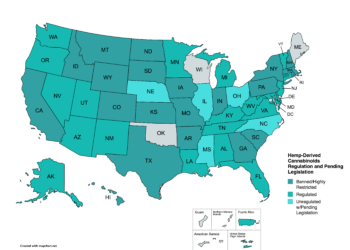The Massachusetts Cannabis Control Commission could be taking a step toward stabilization now that state Treasurer Deb Goldberg officially terminated Shannon O’Brien as commission chair after a year-long suspension and named a new acting chair.
O’Brien had been suspended since September 2023. Meanwhile, Commissioner Ava Callender Concepcion has been on leave since mid-August, leaving the state’s cannabis regulatory agency with just three of five commissioners.
While the former chair was still just suspended, the remaining commissioners were responsible for choosing an acting chair among themselves. This resulted in multiple contentious votes and two different commissioners, Concepcion and Kimberly Roy, serving as acting chair before Goldberg officially named Commissioner Bruce Stebbins as acting chair.
“I am confident that Commissioner Stebbins will ensure stability during this period and will continue to positively impact the important mission of the CCC,” said Goldberg in a released statement. “I am grateful that he has agreed to serve in this capacity until a permanent chair is appointed.”
While the commission has been enduring turmoil from its commissioners, the agency has also experienced an exodus from its executive staff, including the executive director who left in late 2023, as well as the chief counsel, director of licensing and the chief communications officer.
The commission expects to name a new executive director in October, with the other positions coming sooner, according to acting Executive Director Debra Hilton-Creek.
Licensing work continues despite leadership void
Based on their own figures, the turmoil does not appear to have hindered the agency’s licensing responsibilities. The CCC was able to review new applications within an average of 3.98 days throughout 2023. This year, that average has increased to only 4.37 days, and that is with the added requirement of vetting Host Community Agreements, which also became standardized this year.
Applications continue to plummet year to year. In 2021, there were 426, and then 250 in 2022, followed by 107 in 2023. So far this year, only 37 applications have been submitted to the CCC.
Speaking to that trend, the CCC faced a light licensing schedule for its September meeting. The commission approved one provisional license for a delivery service and three final licenses, one for manufacturing and two for retail. Aside from new licenses, the commission approved three ownership changes and 58 renewals.
Despite the drop in demand, more operators continue to open. There were 838 active licenses and 843 approved/pending licenses across all categories in the state as of Sept. 16, according to the CRB Monitor licensing database.
“Businesses are continuing to open their doors,” said CCC Licensing Analyst Derek Chamberlin, during a Sept. 12 commission meeting. “Even in light of some of the closure slides we’ve presented in the past, the number is still growing and growing in terms of those commence operation orders.”
As per state regulations, the governor appoints one commissioner, who has a background in public health, mental health or substance abuse. The attorney general shall appoint a commissioner with a background in public safety, and the state treasurer will appoint a commissioner who has a background in corporate management. The remaining two commissioners shall be approved by a majority vote between the governor, attorney general and treasurer. The treasurer also has the right to name a chair among the commissioners.
Goldberg’s first appointment to the CCC was Stephen Hoffman, who was also made the chair. After launching the adult-use market, Hoffman resigned from his post with months left on his five-year term, in April 2022.
After a brief period in which Sarah Kim, chief counsel for the treasurer’s office, served as interim chair, Goldberg named Shannon O’Brien as the permanent chair.
Roughly a year after O’Brien took office, Goldberg placed O’Brien on administrative leave in September 2023, after she allegedly made racially insensitive remarks and created a hostile work environment. That was reportedly within the context of O’Brien constantly butting heads with former Executive Director Shawn Collins, according to court documents O’Brien filed in a lawsuit against the suspension.
As part of her lawsuit O’Brien demanded a public hearing rather than a private one to determine whether she should be fired. O’Brien ultimately lost in court, and finally on Sept. 9, 2024, she was officially terminated as chair.
“After careful consideration of over twenty hours of meetings, reviewing hundreds of pages of testimony and documents, and evaluating statutes, case law and policies, I have decided to remove Chair O’Brien,” Goldberg announced in a statement. “The chair committed gross misconduct and demonstrated she is unable to discharge the powers and duties of a CCC commissioner.”
O’Brien is reportedly expected to sue in response to her firing.













